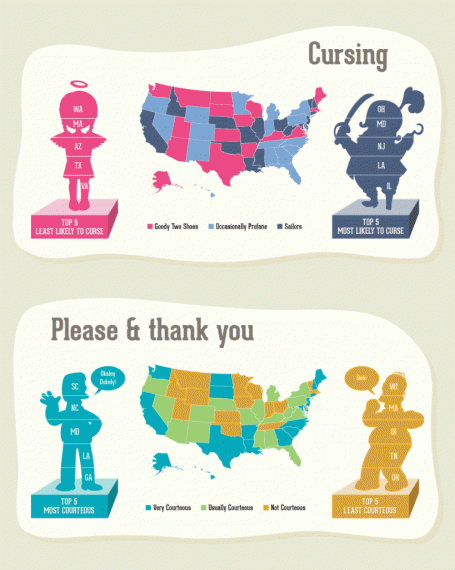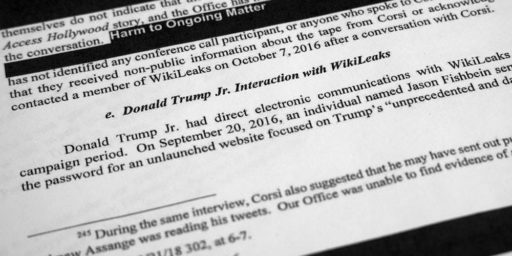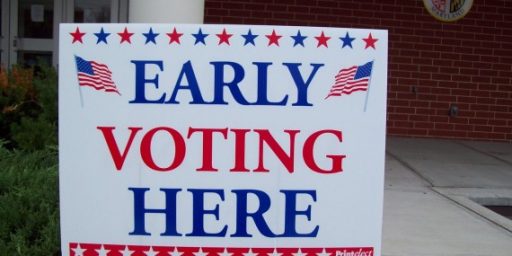Which States Curse The Most?
According to a new study, Ohioans are most likely to need to have their expletives deleted:
Are you f*&!ing serious?
As a native Buckeye who’s lived in Washington for eight years, this was my first reaction to the data analysis released today by our Marchex Institute, which found that people in Ohio curse the most in the country. Washingtonians, by contrast, curse the least. (WTF?)
The data also placed Ohioans in the Top 5 “Least Courteous” category. Apparently, residents there have a harder time saying “please” and “thank you,” which were the keywords that Marchex’s Call Mining technology scanned for when aggregating data on pleasantries.
It’s fascinating stuff. And it coincides with National Etiquette Week, a seven-day ‘gentle reminder,’ if you will, to be civil and courteous to one another.
The Institute, Marchex’s data and research team, examined more than 600,000 phone calls from the past 12 months. The calls were placed by consumers to businesses across 30 industries, including cable and satellite companies, auto dealerships, pest control centers and more.
The Institute scanned for curse words from A to F to S. Analysts then linked the frequency of those words with all 50 states.
Following Washington in the “Goody Two Shoes” category – states where people are least likely to curse – were Massachusetts (2nd place), Arizona (3rd place), Texas (4thplace), Virginia (5th place).
Ranking behind Ohio in the “Sailors” category – states where people are most likely to curse – were: Maryland (2nd place), New Jersey (3rd place), Louisiana (4th place), Illinois (5th place).
The infographic tells the story:
As a native of New Jersey, I must say I find our state’s third place showing in the “cursing” category hard to believe. Perhaps they should’ve monitored the highways instead of just phone calls.







Where the F%$K is NY?
When I returned to Oregon after 3 years in Germany in 1972 my biggest shock was that females were using the “F” word. Something unheard of 3 years before.
I think there’s got to be something wrong with their methodology. Iowa, Minnesota, and Wisconsin among the least. courteous? That's really contrary to my experience. I conjecture that they're confusing discourteous with taciturn.
@Ron Beasley: Well, you were gone for three years and the Oregonian ladie were desperate for a f..,
My home state of NJ is among the very courteous and in the top 5 of cursing. Ah yes I remember my mom teaching me “It’s pass the fu*#%king salt, please“.
that was published last May.
OSU fans are among the most rude and violent in the country, so this doesn’t surprise me. They’re probably just irritated from having to smell manure all the time, though.
@Dave Schuler:”Iowa, Minnesota, and Wisconsin among the least. courteous?”
Expressions like Ookie-Dookie, Darn-tootin’ and you-betcha must not have been considered polite.
Interesting how weak the regional patterns are, especially with cursing. There’s a little more on the “please” and “thank you” map, particularly in the South, but that swearing map really doesn’t show a pattern. It makes me suspicious of the study.
@Pinky:
Just out of curiousity, why would you assume a strong regional pattern in politeness and swearing (or any at all)? Excluding stereotypes, what would cause you to assume a certain region would be more polite then another? Is there a specific factor you’re taking into account?
@KM: I haven’t lived in every part of the country, so I don’t know what pattern I’d expect to see emerge, but I would expect some kind of pattern. Regions have different cultures: different religions, ethnic backgrounds, histories, sports, music, et cetera.
On the other hand, as I’ve commented before on this site with regard to the red state / blue state myth, the real split in the US is between urban and rural areas. A high urban-to-rural ratio will show up at the state level as “blueness”, but that misses the underlying regional effect. Every state you can name has a Democratic zone and a Republican zone. There are parts of Massachusetts that vote to the right of parts of Mississippi.
But – I don’t see that really reflected in the data either. So I have to wonder if the states are actually really close or if the sample in this study was really small.
@Pinky:
I would say both, actually. In regards to the study, the fact that it’s phone calls is what’s throwing me. Perhaps something a little more representative of daily life – after all, how many minutes a day are you one the phone regularly? With whom (not gonna cuss the boss out now….) and relative comfort level will also make a huge difference in what we might call creative sentence enhancers. I come from a military family and can let fly…. but only with those I’m comfortable with. Everyone else I “yes’sir” to death.
On the other hand, the scattershot is exactly what I would expect. In this one thing, it seems, Americans can be united. I’ve lived all my life in the reddest part of a blue state and can tell you culture doesn’t mean a thing in regards to this. Its the intent that matters here – an f-bomb and a bless-you-heart come from the same place. If I gosh-darn you to your face, I’m still trying to insult you (if only in a passive-aggressive way). This seems more like a vocabulary thing as opposed to a swearing thing.
@KM: I checked out the site, and although it didn’t specify, it looks like the survey data was customer service or helpline calls. Probably people at their worst – although I don’t know how that would affect the data.
As a native New Jerseyan, I am appalled that we aren’t number one. Has anyone been on the Turnpike or downtown Newark?
American English has more curse words because the Puritans were offended by any word that referred to bodily functions or sex. In England the worse curse word is bloody which is a reference to the menstrual cycle from Leviticus. The poor Germans have to borrow curse words from English. It’s all really silly.
@Ron Beasley: I believe that “bloody” comes from swearing an oath on Christ’s blood. I also think that “cunt” is considered the most serious profanity in England, with “fuck” being somewhere around US’s “damn”.
By “new study” you mean published and reported on everywhere else back in May?
@Pinky: That depends on how ‘cunt’ is being used. Applied to a male, it’s offensive, but not nearly as offensive as when applied to a female. The Brits use is similar to — though not identical to — the French use of ‘con’.
I remind people that are offended by ”cunt” that it is Shakespearean, but that doesn’t generally seem to matter to them.
I like the Dutch style cursing. They have no problem with terms associated with sex or bodily functions. The ‘bad’ words there are mostly diseases, like kanker hond (cancer dog) or syfilitische hoer (syphilitic whore) and blasphemy (god damn etc). Those make much more sense to me.
California: Most likely to curse and most polite. It’s true, I’m always saying Thanks, Motherf**ker!